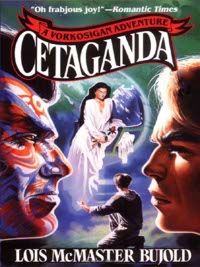I don’t like Cetaganda (1995). I’ve never liked it. I often skip it on re-reads, to such an extent that re-reading it now was almost like reading a new book. (There’s a disadvantage of re-reading as much as I do in that there are series where the books I don’t like become, in time, the ones I like the best because they’re the ones that retain freshness after I have the ones I like memorised. I can see Cetaganda getting on that list along with Five Red Herrings and Our Man in Camelot.)
Cetaganda is a very slight book, to have been written between Mirror Dance (1994) and Memory (1996). It’s set two years after The Vor Game (1990). It features Miles and Ivan going off to Cetaganda to a diplomatic function, where they get into trouble and out of it again. It’s notable in being the first of the series apart from Ethan of Athos (1986) that’s definitely a mystery and not a military adventure, and I suppose that’s the logic in binding it with Ethan of Athos and “Labyrinth” as Miles, Mystery and Mayhem. Or maybe not. Most of the reprint compilations make perfect sense to me, but this not one.
Cetaganda is about Cetaganda, the mysterious empire that has, thus far in the series, been seen only as a mysteriously aggressive enemy. It’s first mentioned in Shards of Honor (1986) when Cordelia thinks her camp might have been trashed by Barrayarans, Cetagandans or Nuevo Brasilians—maybe we’ll see some of those one day. We then hear that there have been three wars between Cetaganda and Barrayar, and later encounter Ceragandans, always as bad guys. They are the invaders in The Vor Game, and the prison guards in “The Borders of Infinity.” They’re pursuing Admiral Naismith across London in Brothers in Arms, (1989) and we know they have painted faces, ghem-captains, and itchy trigger fingers. In Cetaganda we find out a lot more about them… and unfortunately, I don’t find them that interesting.
One of the things I’ve noticed on this re-read is that the amount I like the books tends to be directly proportional to how much Barrayar there is in them. It seems that the thing I really like about this series is the Barrayaran roots. So that’s my new complaint, not enough Barrayar. The book starts with arriving on Cetaganda and ends with leaving it. That also means we don’t see any of the familiar Barrayaran characters except for Miles and Ivan, though Illyan is referenced.
However, my original complaint about Cetaganda when I first read it was that it doesn’t have any Admiral Naismith or Dendarii Free Mercenaries—Miles is Lieutenant Vorkosigan all through. So not only do we not have any of the familiar Dendarii characters, there’s no Miles duality to make it interesting. And compared to the Miles I just left in Mirror Dance, Miles at twenty-two seems strangely shallow, without everything he has learned since—and the same goes for Ivan. I don’t think this is a complaint because I wanted a MilSF adventure and got a mystery. It’s more than I wanted a novel and got a romp. This is particularly noticeable in publication order.
The stakes are also fairly low in this book. We know Miles and Ivan escape pretty much unscathed. What happens to them is amusing enough, but that’s all. There’s no real possibility of a Cetagandan explosion, because we know it didn’t happen. We know they did attack Marilac, and seeing the complacent Marilacans beforehand is one of the nice touches.
What else do I like, apart from the Marilican Embassy? Ivan and the anti-aphrodisiac and the consequences of him getting away with it. Yenaro, the descendant of the General who failed to defeat Barrayar, who is a perfumer. The garden with the luminescent frogs who sing in chords. Miles getting the medal and saying he won’t wear it unless he needs to be really obnoxious—which looks forward to the scene in Memory where he wears all his medals. Ghem-Colonel Millisor calling in from Ethan of Athos, which I had totally forgotten about until reminded here.
I don’t find the Cetagandan political set-up very plausible, and worse, I don’t find it very interesting. The same goes for the actual mystery and solution, which I’d half-forgotten. I don’t like Miles’s desire to keep information to himself and be a hero charming, in the context of what’s going to happen when he, as Elli puts it at the beginning of Mirror Dance, runs out of hairs to split with these people. I don’t much care for the supernatural beauty of the haut ladies floating around in their bubbles. (“Mutants on purpose are still mutants.”)
The duality here is between sincere (if rough around the edges) masculine Barrayar and highly civilized (if not all the way over into decadent—that kitten tree!) feminine Cetaganda. It’s interesting that there’s more to Cetaganda than a tendency to shoot first and ask questions later, but did they have to be quite this effete? This depth of Cetaganda is set up for Diplomatic Immunity (2002), but I don’t like the Cetagandan bit of that either. Maybe it’s just me and everybody else loves Cetagandans, the haut and the ghem?
It may be worth noting here that despite coming after three consecutive Hugo winning-novels this was not even nominated for a Hugo, as discerning Hugo-nominating Bujold fans, far from being mindlessly adoring of everything she writes, noticed that this was a minor work.










